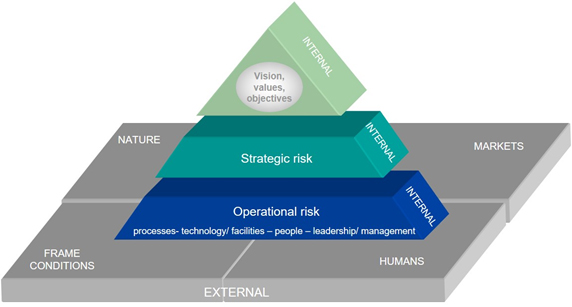Enterprise Risk Management
Enterprise Risk Management (ERM) provides a framework to understand and respond to business uncertainties and opportunities with relevant risk insight delivered through common, integrated risk identification, analysis and management disciplines. ERM enhances organizational resiliency by improving decision making, strengthening governance and supporting a risk intelligent culture.
Enterprise risk management is a process, effected by an entity’s board of directors, management and other personnel, applied in strategy setting and across the enterprise, designed to identify potential events that may affect the entity, and manage risk to be within its risk appetite, to provide reasonable assurance regarding the achievement of entity objectives
Different risks are managed at different levels.

Enterprise Risk Management encompasses:
Aligning risk appetite and strategy
Management considers the entity’s risk appetite in evaluating strategic alternatives, setting related objectives, and developing mechanisms to manage related risks.
Enhancing risk response decisions
Enterprise risk management provides the rigor to identify and select among alternative risk responses – risk avoidance, reduction, sharing, and acceptance.
Reducing operational surprises and losses
Entities gain enhanced capability to identify potential events and establish responses, reducing surprises and associated costs or losses.
Identifying and managing multiple and cross-enterprise risks
Every enterprise faces a myriad of risks affecting different parts of the organization, and enterprise risk management facilitates effective response to the interrelated impacts, and integrated responses to multiple risks.
Seizing opportunities
By considering a full range of potential events, management is positioned to identify and proactively realize opportunities.
Improving deployment of capital
Obtaining robust risk information allows management to effectively assess overall capital needs and enhance capital allocation.
At Enterprise Level, KTT helps clients develop:
- Risk Strategy and Appetite
- Risk Framework
- Risk Accessment
- Risk Mitigation Plans
- Risk Advisory Solutions
- Audits
- Change Management
- Gap Analysis
- Process Improvement
- Project Risk Management
- Cost Risk Assessment
- Project Risk Tools
- Independent Project Reviews
- Cyber Security Assessment
- Cyber Threat Management
Contact us for more details
